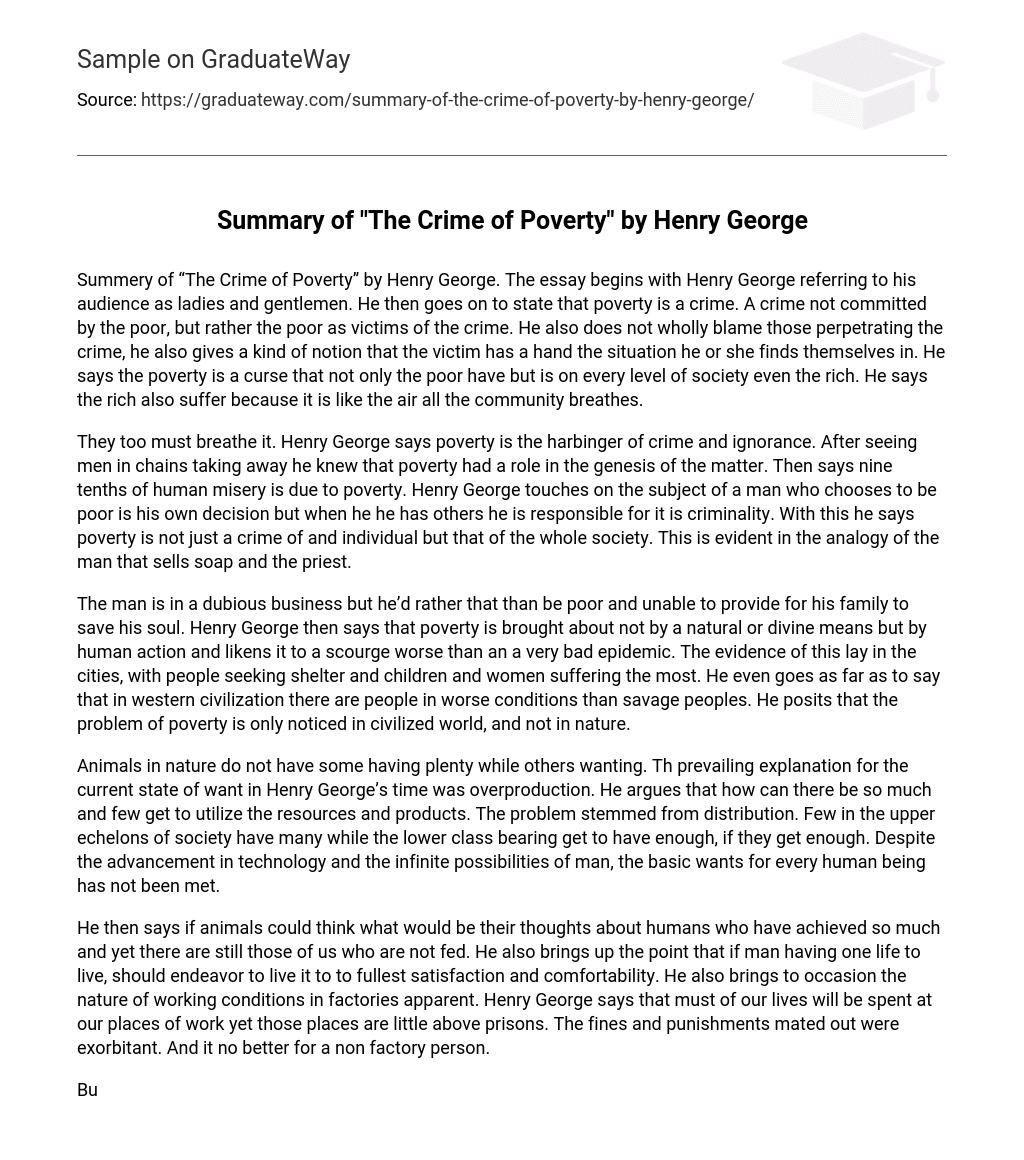Summery of “The Crime of Poverty” by Henry George. The essay begins with Henry George referring to his audience as ladies and gentlemen. He then goes on to state that poverty is a crime. A crime not committed by the poor, but rather the poor as victims of the crime. He also does not wholly blame those perpetrating the crime, he also gives a kind of notion that the victim has a hand the situation he or she finds themselves in. He says the poverty is a curse that not only the poor have but is on every level of society even the rich. He says the rich also suffer because it is like the air all the community breathes.
They too must breathe it. Henry George says poverty is the harbinger of crime and ignorance. After seeing men in chains taking away he knew that poverty had a role in the genesis of the matter. Then says nine tenths of human misery is due to poverty. Henry George touches on the subject of a man who chooses to be poor is his own decision but when he he has others he is responsible for it is criminality. With this he says poverty is not just a crime of and individual but that of the whole society. This is evident in the analogy of the man that sells soap and the priest.
The man is in a dubious business but he’d rather that than be poor and unable to provide for his family to save his soul. Henry George then says that poverty is brought about not by a natural or divine means but by human action and likens it to a scourge worse than an a very bad epidemic. The evidence of this lay in the cities, with people seeking shelter and children and women suffering the most. He even goes as far as to say that in western civilization there are people in worse conditions than savage peoples. He posits that the problem of poverty is only noticed in civilized world, and not in nature.
Animals in nature do not have some having plenty while others wanting. Th prevailing explanation for the current state of want in Henry George’s time was overproduction. He argues that how can there be so much and few get to utilize the resources and products. The problem stemmed from distribution. Few in the upper echelons of society have many while the lower class bearing get to have enough, if they get enough. Despite the advancement in technology and the infinite possibilities of man, the basic wants for every human being has not been met.
He then says if animals could think what would be their thoughts about humans who have achieved so much and yet there are still those of us who are not fed. He also brings up the point that if man having one life to live, should endeavor to live it to to fullest satisfaction and comfortability. He also brings to occasion the nature of working conditions in factories apparent. Henry George says that must of our lives will be spent at our places of work yet those places are little above prisons. The fines and punishments mated out were exorbitant. And it no better for a non factory person.
But for three hours of the whole day to his or herself the rest are spent working. In a sense is it is the saying that people can’t get time to even enjoy their own lives or the fruits of their labors. They are no better than machines for work only. He criticizes the proponents that say the working conditions are improving. The rate of pay increase is very insignificant to the cost of living. And he compares the working hours to the dark ages in which the people of the dark ages worked less. One thing people feared to disturb labor and production of sustenance was famine.
He also brings to light the fact that child labor is common practice. A fact the Sioux chiefs were astonished to find children working in decrepit conditions, and not the technological advances. This was his reason give that if he children are working they are certainly not playing or going to school. This he warned if the status quo continued would have dire consequences for the future. Henry George lays the cause of poverty primarily on injustice. This injustice is from the monopolization of natural resources by an elitist oligarchy, land in particular. He also points out that one form of slavery gave way to another.
This form more clandestine due to it’s wrappings and proclamations of freedom. He also points out how the fact that the working class are the poor. This he said any rational being would find absurd that the working class produce that which makes life more convenient yet they get little to nothing of their products. He also condemns the claim that the poor are that way by their own doing. He also proposes the idea of no taxation which would improve people’s wages and increase production. But most importantly that people think about the nature of poverty as a crime; a harm done to them.





